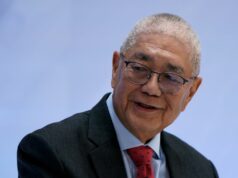Silence and simplicity in Manila Notes
SILENCE, slowness, and finesse are characteristics that are typical in Japanese films and plays. Manila Notes — an adaptation of the play Tokyo Notes — won’t be any different.
Translated into Filipino by playwright Rody Vera, Manila Notes is about the ordinary conversations between lovers, friends, and family members, set in an art museum lobby in Manila amid an ongoing war in Europe. The story doesn’t have a historical background because it is just imagined and is designed to happen some time in the future.
The play is an adaptation of Oriza Hirata’s Tokyo Notes, which he also directed.
Unlike the typical drama and spectacle the Filipino audience is used to seeing on screen and on stage, Manila Notes instead celebrates simplicity, comfortable silence, and muted confrontations.
MANY TRANSLATIONS
Tokyo Notes has been translated to more than 15 languages, with the play’s name changed to the location it is performed in so aside from Manila Notes, there is a Seoul Notes, Taipei Notes, and Bangkok Notes.
Mr. Hirata, who was present at the press conference on Nov. 13, said Mr. Vera’s translation was the best version — even better than his, he said in Japanese.
Mr. Hirata hopes that Manila Notes will contribute to our culture and arts. He said he’s looking forward to working with Filipino talents in creating “a brand new type of theater practice.”
He said more artists should aim to create plays and works that challenge and compliment the audiences’ intelligence; something that will make them think.
Mr. Vera, Mr. Hirata, and the 20 actors in the cast of Manila Notes have been having discussions, collaborations, rehearsals, and workshops in preparation for the play’s opening on Nov. 30.
Mr. Vera’s challenge was to find the layers of meanings in the text and to adapt the nuances to the local setting. He said: “It’s an imaginary Tokyo somewhere in the future, but it’s not like a science fiction setting — it’s very today, but, at the same time, there are very small clues that will tell you that it has not happened before, it has no historical basis, and it must have been something that happen or that might happen in the future.”
The Filipino playwright went to the Metropolitan Museum of Manila, the quietest place he has been here and the closest to Tokyo Notes’ version, and tinkered there, “because you know that when you go to the National Museum, it’s like going to Divisoria,” he said, with a laugh.
SIMPLE DESIGN
True to Japanese aesthetics, the set design — a simple museum lobby with two benches — was a collaboration between Japanese set designer Itaru Sugiyama and some Filipino theater students and practitioners.
The entire production is a collaboration between the Japan Foundation in Manila and Tanghalang Pilipino.
Manila Notes will run at the Cultural Center of the Philippines’ Little Theater from Nov. 30 to Dec. 16.
While the play is in Filipino, there will be English subtitles on the Nov. 30 and Dec. 2 performances.
The 20 actors in the cast are a mix of thespians from PETA, universities, and current members or alumna of Tanghalang Pilipino: Meann Espinosa, Mayen Estañero, Dennis Marasigan, Gie Onida, Ian Segarra, J-Mee Katanyag, Neomi Gonzales, Wenah Nagales, Kathlyn Castillo, Randy Villarama, Elle Velasco, Jonathan Tadioan, Marco Viaña, Lhorvie Nuevo, Antonette Go, Joshua Tayco, Manol Nellas, Micah Musa, Manuel Tinio, and Manjean Faldas.
For ticket reservations, group sales, sponsorships, and special performances, contact Juan Marco Lorenzo at 0999-884-3821 or Lorelei Celestino at 0915-607-2275 or 832-1125 local 1620/1621. Tickets are also available at TicketWorld online and at the CCP Box Office. — Nickky Faustine P. de Guzman



